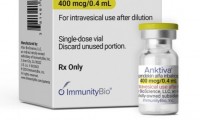-
Spatial Tissue Analysis Identifies Patterns Associated With Ovarian Cancer Relapse
- Source: drugdu
- 82
- April 25, 2024
-
Unique Autoantibody Signature to Help Diagnose Multiple Sclerosis Years before Symptom Onset
- Source: drugdu
- 87
- April 25, 2024
-
FDA Approves Immunotherapy That Can Spare Bladder Cancer Patients From Radical Surgery
- Source: drugdu
- 79
- April 25, 2024
-
Positive Results from Phase 3 SELECT-GCA Study of Upadacitinib (RINVOQ®) in Patients with Giant Cell Arteritis
- Source: drugdu
- 79
- April 25, 2024
-
First Subject Dosed for Phase 1 Clinical Trial of Henlius’ Novel Anti-GARP/TGF-β1 mAb HLX6018
- Source: drugdu
- 121
- April 25, 2024
-
CureVac and MD Anderson Cancer Center partner to develop new cancer vaccines
- Source: drugdu
- 114
- April 24, 2024
-
Vertex’s pain drug suzetrigine advances in FDA approval process
- Source: drugdu
- 85
- April 23, 2024
-
GSK’s Five-in-One Meningococcal Vaccine Under Review by the FDA
- Source: drugdu
- 145
- April 20, 2024
-
Chemomab touts study confirming CCL24 link to systemic sclerosis severity
- Source: drugdu
- 73
- April 20, 2024
your submission has already been received.
OK
Subscribe
Please enter a valid Email address!
Submit
The most relevant industry news & insight will be sent to you every two weeks.













